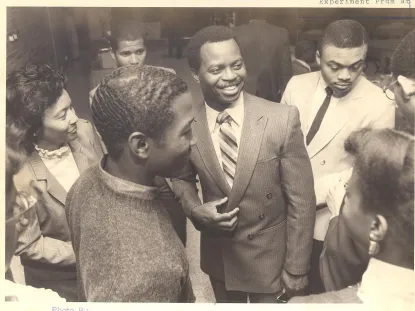The Ronald E. McNair Post-Baccalaureate Achievement Program is designed to prepare participants for doctoral studies through involvement in research and other scholarly activities. McNair scholars are from disadvantaged backgrounds and have demonstrated strong academic potential.
Northern Michigan University’s McNair Scholars Program works closely with students in completing their undergraduate requirements, encouraging and supporting their entrance into graduate programs, and tracking their progress to successful completion of advanced degrees. The goal of McNair is to increase the attainment of Ph.D. degrees by students from underrepresented segments of society.
McNair Scholars are undergraduate students who have the desire, drive, and capability to complete their baccalaureate degrees and continue beyond a Ph.D. program.
The McNair Scholars program is funded by the U.S. Department of Education to serve first-generation college-bound students who also have financial needs. Additionally, students who are traditionally underrepresented in doctoral programs are eligible to apply.
The program assists scholars in developing study and research skills, navigating graduate school admissions, finding academic tutoring, and actively participating in summer or real research with a faculty mentor. This research results in a publishable paper and presentation poster.
We encourage you to join the McNair Scholars program, as an undergraduate participant, a faculty mentor, or simply a supportive partner. Let us help you explore your potential.

Our Namesake
Ronald Ervin McNair was born on Oct. 21, 1950 in Lake City, S.C. He attended North Carolina A&T State University in Greensboro where, in 1971, he graduated magna cum laude with a bachelor’s degree in physics. In 1976, he earned his doctorate degree in physics from the Massachusetts Institute of Technology.
Dr. McNair’s many distinctions include: Presidential Scholar (1967-71), Ford Foundation Fellow (1971-74) and National Fellowship Fund Fellow (1974-75). He was also named Omega Psi Phi Scholar of the Year (1975), was honored as the Distinguished National Scientist by the National Society of Black Professional Engineers (1979) and received the Friend Of Freedom Award (1981).
McNair was nationally recognized for his work in the field of laser physics. In 1978, he was one of 35 applicants selected from a pool of 10,000 for NASA’s space shuttle program. On his first space shuttle mission in February 1984, McNair orbited the earth 122 times aboard Challenger. He was the second African American to fly in space.
He received three honorary doctorates and was also a sixth-degree karate black belt and an accomplished jazz saxophonist.
On the morning of Jan. 28, 1986, McNair and six other crew members died in an explosion of the space shuttle Challenger.
After his death in the Challenger Space Shuttle accident, members of Congress provided funding for the Ronald E. McNair Post-Baccalaureate Achievement Program. Their goal was to encourage low-income and first-generation college students, and students from historically underrepresented ethnic groups to expand their educational opportunities by enrolling in a Ph.D. program and ultimately pursue an academic career. This program is dedicated to the high standards of achievement inspired by Dr. McNair’s life.







